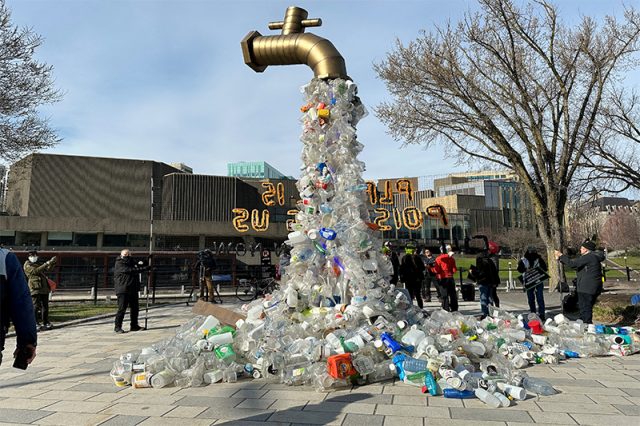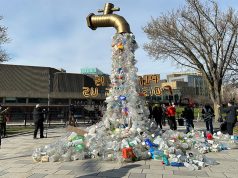
OTTAWA — Whether clearing trash washing up on beaches or replacing plastic products with eco-friendly alternatives, developing countries grappling with plastic pollution have one common demand – money.
The billions of dollars needed to finance pollution policies and plastics alternatives came into sharp focus during the penultimate round of negotiations on a plastics treaty that ended early on Tuesday in the Canadian capital of Ottawa.
Countries remain divided over whether the treaty should seek to restrict single-use plastics, ban chemicals that have raised health concerns, or limit production of plastics.
They also disagree about who should pay – putting efforts to tackle the plastics crisis on the same tenuous footing as other underfunded environmental goals like curbing climate-warming emissions or protecting biodiversity.
For tackling plastics, the United Nations Environment Programme estimates about $1.64 trillion is needed by 2040 to drive new policies and create systems for measuring and reducing pollution.
Meanwhile, plastic production is on pace to triple by 2060, making the task more urgent.
“Given the amount of plastic being generated, no one can afford to pay for it,” said Froilan Grate, Asia-Pacific director for the Global Alliance for Incinerator Alternatives.
Call for cash
Wealthy nations want to channel funding for plastics programs through the U.N. Global Environment Facility (GEF). Over the last three decades, the partnership of 18 agencies has provided about $25 billion for projects related to climate change, protecting nature and cleaning up pollution.
Developing countries are wary of relying on the facility, saying the funds are difficult to access and could force countries to compete. They also worry about money being repurposed from other environmental priorities.
“The financing mechanisms for other multilateral environmental agreements are not working for us,” said Sivendra Michael, Fiji’s lead negotiator in Ottawa. “We need to design a comprehensive financial package that is new and has adequate, predictable, sustainable and long-term financing.”
Countries including Rwanda, Chile, Micronesia and Senegal proposed creating a new fund to help poor countries run programs and policies for tackling plastic pollution.
“The funding should be raised from member states,” and should be prioritized for those struggling in basic sectors such as education or health, Rwanda’s lead negotiator Juliet Kabera said.
Negotiators from wealthier countries cautioned that a new fund could take years to establish.
Countries also disagreed about who should pay.
The United States, which generates the most plastic waste, has argued along with the European Union that the treaty should be partly funded by financial institutions and the private sector.
Saudi Arabia and China, among the world’s biggest plastics producers, insisted that GEF’s traditional donor nations also pay for plastics.
Observers lamented that parties were sticking to their usual positions in Ottawa rather than looking for new ways to mobilize finance.
“Let’s not talk about how we share the burden and how we bear the burden. Let’s talk about all the places money might hypothetically come from,” said Carroll Muffett, president of the Center for International Environmental Law.
New paths for finance
From reaching out to philanthropies to devising a system of “offsets,” countries have proposed myriad ways for creating new cash streams for plastics projects.
Last week, Ghana proposed imposing fees on producers of plastic that could help fund cleanup efforts.
“Getting money from donors is not enough. We need to think outside the box and rope in the private sector,” said Lydia Essuah, negotiator for Ghana and the Africa Group.
In developing countries, municipal budgets need an estimated $40 billion to deal with plastic waste in cities, the International Finance Corporation said in a 2021 report.
Countries in Ottawa also discussed creating a system by which manufacturers or consumer companies assume “Extended Producer Responsibility” for what happens to the plastic products they are using or selling to the public.
Industry groups support this approach for encouraging more disclosures and boosting recycling and reuse, said Stewart Harris, global plastics policy director at the American Chemistry Council.
“It’s an incredibly effective policy tool to send a signal up through the value chain to … really shift to towards those more circular systems,” he said.
Another idea discussed involves “plastic credits” for clean-up efforts that could be used to offset plastic production elsewhere. Such credits, which are recognized in some countries such as the Philippines, met opposition from environment groups that said such systems lack oversight and accountability.
— Reporting by Valerie Volcovici; Editing by Katy Daigle and Richard Chang









